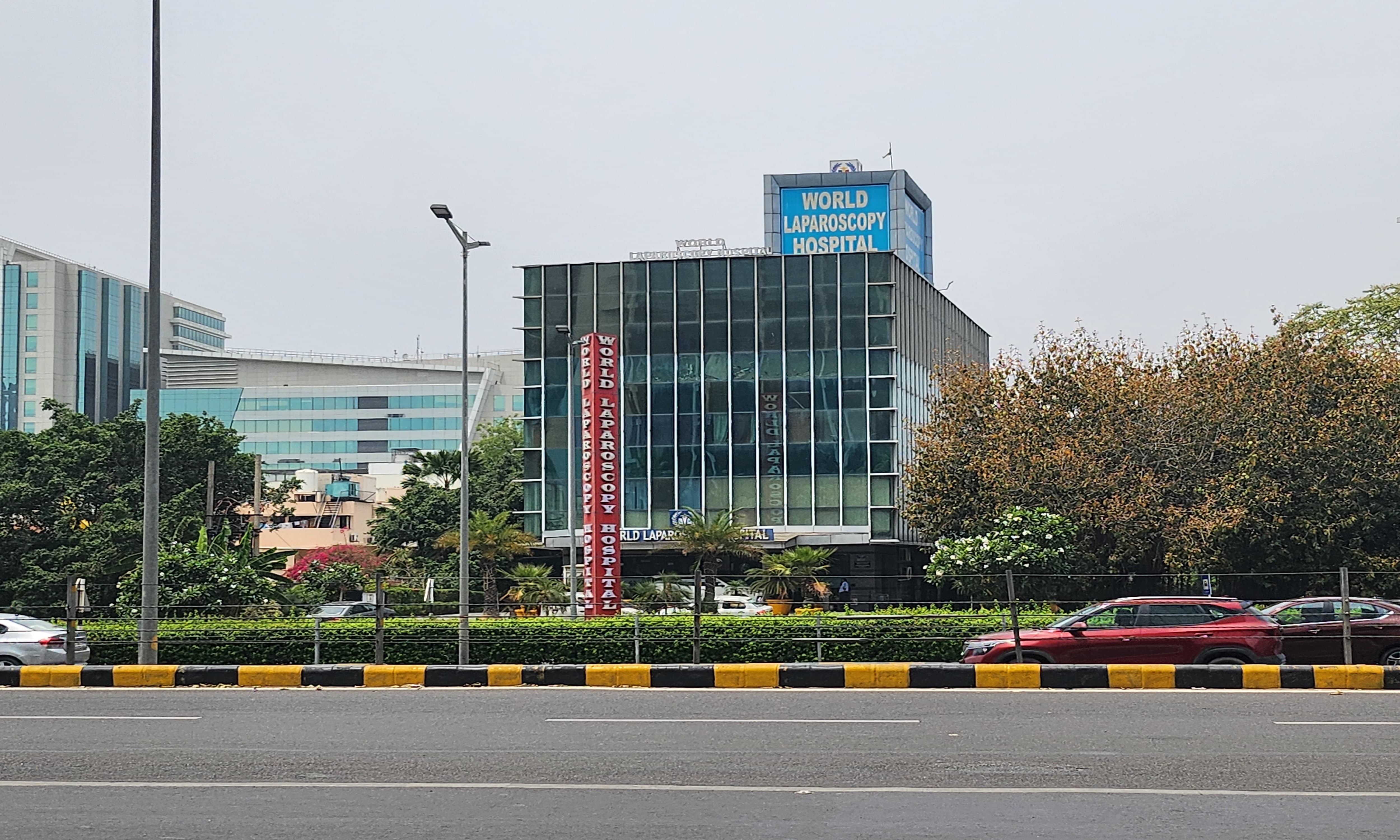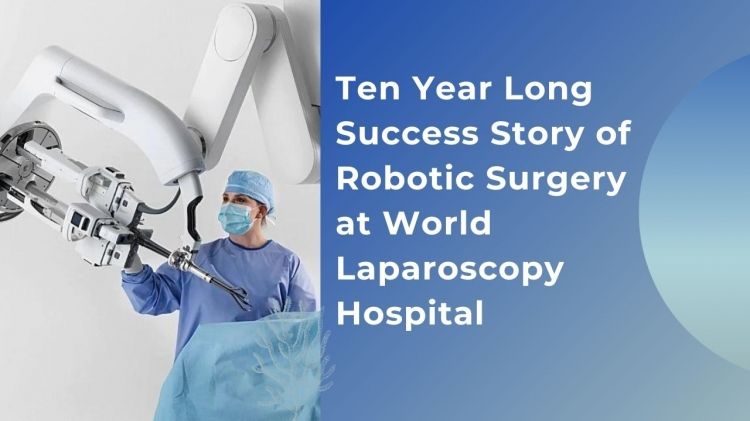
World Laparoscopy Hospital is proud to celebrate the 10th anniversary of its department of Robotic Surgery. Over the past decade, we have built a new tradition of patient care and are the first private hospital in India to start da Vinci Robotic surgery. This has led us to achieve exceptional results and marked a major milestone in the history of robotic surgery in India said Dr. R.K. Mishra, Director, World Laparoscopy Hospital.
World Laparoscopy Hospital is the second hospital in India after All India Institute of Medical Sciences to start da Vinci Robotic Surgery. Till now hundreds of advanced robotic surgery has been performed and thousands of surgeons are trained at this institute for robotic surgery.

World Laparoscopy Hospital offers Fellowship of International College of Robotic Surgeons to surgeons and gynecologists. The da Vinci Surgical System allows surgeons to perform complex procedures with small learning curves using a robotic minimally invasive approach routinely and with confidence; the surgeon can perform most of the robotic surgery.

The da Vinci Robotic Surgery System retains and builds on the core robotic technology of advanced 3D HD visualization with up to 25x magnification and an immersive view of the operative field with endo wrist instrumentation with dexterity and range of motion far greater than even the human hand. Intuitive Motion da Vinci technology, which replicates the experience of open surgery by preserving natural eye-hand-instrument alignment and intuitive robotic instrument control.
No individual can take the credit for all those years of success. Celebrating a tenth-anniversary milestone is a big achievement in itself. It’s a celebration for all who have been a part of the institute through all those years.
Robotic surgery is a relatively new technology that has revolutionized the field of surgery. It offers many benefits over traditional open surgery, including smaller incisions, less blood loss, reduced pain and scarring, shorter hospital stays, and faster recovery times. One institution that has been at the forefront of robotic surgery is the World Laparoscopy Hospital (WLH) in Gurugram, India. This essay will explore the ten-year success story of robotic surgery at WLH, including its history, achievements, and future prospects.
History of Robotic Surgery at WLH
WLH is a specialized hospital that is dedicated to the advancement of laparoscopic and robotic surgery. The hospital was founded in 2001 by Dr. R.K. Mishra, a laparoscopic surgeon with over 30 years of experience in the field. Dr. Mishra recognized the potential of robotic surgery early on and became an early adopter of the technology.
In 2010, WLH acquired its first da Vinci Surgical System, a robotic surgery platform developed by Intuitive Surgical. The da Vinci system is a complex robotic platform that allows surgeons to perform minimally invasive surgeries with greater precision and control. The acquisition of the da Vinci system marked the beginning of a new era of robotic surgery at WLH.
Achievements of Robotic Surgery at WLH
Since acquiring the da Vinci system, WLH has become a leader in robotic surgery. The hospital has performed over 20,000 robotic surgeries to date, making it one of the most experienced robotic surgery centers in the world. WLH offers a wide range of robotic surgeries, including prostatectomy, hysterectomy, myomectomy, hernia repair, and bariatric surgery.
WLH has achieved many milestones in the field of robotic surgery. In 2014, WLH became the first hospital in the world to perform a robotic surgery on a patient with a giant fibroid uterus. The surgery, which involved the removal of a 6 kg fibroid uterus, was a success and marked a major breakthrough in the field of robotic surgery.
In 2016, WLH became the first hospital in the world to perform a robotic surgery on a patient with a ruptured ectopic pregnancy. The surgery was a success and demonstrated the potential of robotic surgery in emergency situations.
In 2018, WLH became the first hospital in India to perform a robotic surgery on a patient with a complex liver tumor. The surgery, which involved the removal of a 10 cm liver tumor, was a success and marked a major milestone in the field of robotic surgery.
WLH has also made significant contributions to the field of robotic surgery through research and education. The hospital has published numerous research papers on robotic surgery and has trained thousands of surgeons from around the world in the use of the da Vinci system.
Future Prospects of Robotic Surgery at WLH
The future prospects of robotic surgery at WLH are bright. The hospital is constantly investing in new technologies and techniques to improve patient outcomes and reduce the cost of surgery. WLH is currently exploring the use of artificial intelligence and machine learning in robotic surgery, which could lead to even greater precision and accuracy in surgery.
WLH is also committed to expanding access to robotic surgery in developing countries. The hospital has established a program to train surgeons from developing countries in the use of the da Vinci system, with the goal of improving surgical outcomes and reducing healthcare costs in these countries.
WLH is also known for its commitment to ethical and sustainable practices. The hospital uses eco-friendly products and has implemented a number of measures to reduce its carbon footprint, including the use of solar panels and rainwater harvesting. WLH also provides training and education on sustainable practices to its staff and visitors.
WLH has received numerous accolades and awards for its contributions to the field of robotic surgery. The hospital has been recognized as a Center of Excellence in Robotic Surgery by Intuitive Surgical, and has received awards for its contributions to patient safety and quality of care. WLH has also been recognized for its commitment to ethical and sustainable practices, receiving awards for its environmental initiatives and social responsibility programs.
In addition to its achievements in the field of robotic surgery, WLH has also been involved in a number of charitable initiatives. The hospital has provided free surgical care to underprivileged patients through its charitable arm, the World Laparoscopy Hospital Charitable Trust. The trust provides free surgical care to patients who cannot afford treatment, with a focus on women's health issues such as uterine fibroids and ovarian cysts.
Conclusion
The ten-year success story of robotic surgery at WLH is a remarkable achievement. The hospital has been at the forefront of robotic surgery, demonstrating the potential of the da Vinci system to improve patient outcomes and reduce healthcare costs. WLH has achieved many milestones in the field of robotic surgery and has made significant contributions to research and education. The hospital's commitment to patient safety, quality of care, ethical and sustainable practices, and charitable initiatives has made it a leader in the field of healthcare. With continued innovation and dedication, the future prospects of robotic surgery at WLH and in the field of healthcare as a whole are bright.
